小学五年级下册英语知识点总结全册
五年级下册英语知识点归纳整理总结
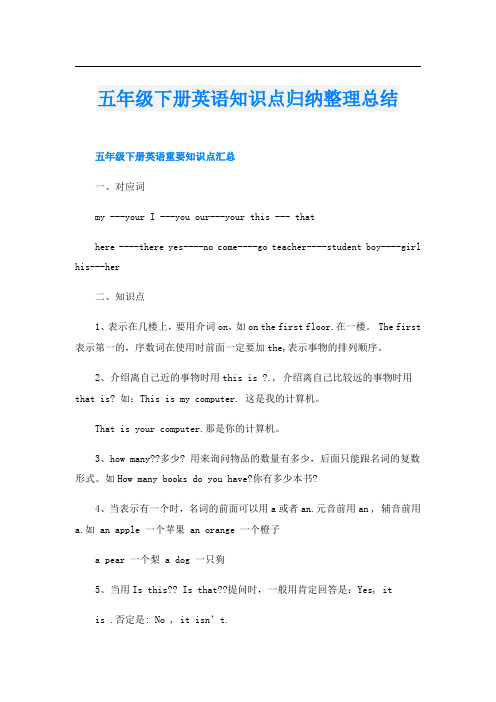
五年级下册英语知识点归纳整理总结五年级下册英语重要知识点汇总一、对应词my ---your I ---you our---your this --- thathere ----there yes----no come----go teacher----student boy----girl his---her二、知识点1、表示在几楼上,要用介词on,如on the first floor.在一楼。
The first 表示第一的,序数词在使用时前面一定要加the,表示事物的排列顺序。
2、介绍离自己近的事物时用this is ?., 介绍离自己比较远的事物时用that is? 如:This is my computer. 这是我的计算机。
That is your computer.那是你的计算机。
3、how many??多少? 用来询问物品的数量有多少,后面只能跟名词的复数形式。
如How many books do you have?你有多少本书?4、当表示有一个时,名词的前面可以用a或者an.元音前用an , 辅音前用a.如 an apple 一个苹果 an orange 一个橙子a pear 一个梨 a dog 一只狗5、当用Is this?? Is that??提问时,一般用肯定回答是:Yes, itis .否定是: No , it isn’t.三、句子:1、This is the teacher’s office.这是老师办公室。
2、That is my classroom.那是我的教室。
3、Go to the library. Read a story-book..去图书馆。
读故事书。
4、Is this the library? Yes, it is.这是图书馆吗?是的。
5Is that the art room? The art room is on the second floor.那是美术室吗?不是,美术室在二楼。
英语五年级下册知识点汇总
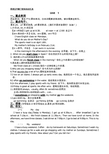
四会单词:课本P72黑体单词,白体词需要读准读熟,部分需要会默写。
二、重点句子:课本p4, p7要求背诵,p9要求熟读。
(请打开课本背诵吧!加油!)1.介词at, on, in的区别【at +时刻】I get up at 6:30. at noon = at 12:00 在正午【on+具体的一天】比如,on+星期,on+节日I have English class on Mondays.What do you do on Mother’s Day?The sports meet is on April 16th.My mother’s birthday is on February 21st.【in +季节,月份】I can swim in summer.in the morning/in the afternoon/in the evening 在早晨、在下午、在晚上2. When do you start class in Spain?你在西班牙什么时候开始上课?3. 询问某人什么时间做某事的句型When do you finish class in the morning?你们上午的课什么时候结束?4.表达某人某时间做某事的句型We finish class at 1 o’clock我们一点钟结束上午的课.5.Why are you shopping today? 你今天为什么购物?6.That sounds like a lot of fun.那听起来很有趣。
7.I live on an island. I always get up early every day. 我居住在一个岛上,我总是每天起很早。
8.I often go swimming in the water. 我经常在水里游泳。
9.In the afternoon, I play sports with my friend. 在下午,我和朋友进行体育运动。
小学英语人教版PEP五年级下册1-6单元知识点总结

Unit1 My day一、基本句型1.询问什么时候做某事:- When do you ……?你什么时候……?- I usually…at …. 我通常在…(点钟)…。
例:-When do you eat breakfast?-I eat breakfast at 7:00.2.What do you do on the weekend?你周末做什么?- I +频率副词+周末活动+时间。
或Sometimes I+周末活动例句:I sometimes go shopping with my mum on the weekend.(周末我时候和妈妈一起去购物)二、知识点:1.频率副词:always(总是,一直)>usually(通常)>often(经常)>sometimes(有时)2.只有Sometimes可以放在句首。
(Sometimes I cook dinner.)3.On the weekend 在周末on Saturdays 在周六on Sundays在周日(别忘加s)Unit2 My favourite season1.-Which season do you like best? (你最喜欢哪个季节?)Why?(为什么)-I like +季节+ best.(I like spring∕summer∕fall∕winter best) Because ___________.(因为)或:-What‘s your favourite season? -My favourite season is spring∕summer∕fall∕winter.2.-Why do you like winter best?(你为什么最喜欢冬天?) -Because______.二、知识点:1.leaf(树叶):复数leaves2.W,W真神奇,问出许多大问题。
what,what,问“什么”,when,when,问“时间”,where,where,问“哪里”,which,which,“哪一个”,why,why,“为什么”.Unit3 My school calendar补充:1.Dragon Boat Festival 龙舟节或端午节(农历五月五日)一般在阳历6月2.月份首字母大写。
五年级下册英语知识点(打印版)

五年级下册英语知识点(打印版)语法知识点1. 一般现在时:这个时态用于描述惯性的动作或重复发生的情况。
例如:I eat breakfast every morning.(我每天早上吃早餐。
)2. 一般过去时:这个时态用于描述过去发生的事情。
例如:He watched a movie last night.(昨晚他看了一部电影。
)3. 将来时:这个时态用于描述将来要发生的事情。
例如:She will visit her grandparents next week.(下周她将去看望她的祖父母。
)4. 现在进行时:这个时态用于描述正在进行的动作。
例如:They are playing soccer in the park.(他们正在公园里踢足球。
)5. 情态动词:情态动词用来表示能力、建议、允许等情态。
例如:Can you swim?(你会游泳吗?)词汇知识点1. 动物:cat(猫)、dog(狗)、elephant(大象)、tiger(老虎)、lion(狮子)2. 食物:apple(苹果)、banana(香蕉)、orange(橙子)、watermelon(西瓜)、cake(蛋糕)3. 数字:one(一)、two(二)、three(三)、four(四)、five(五)4. 颜色:red(红色)、blue(蓝色)、yellow(黄色)、green (绿色)、purple(紫色)5. 学科:English(英语)、math(数学)、science(科学)、history(历史)、art(艺术)句型知识点1. How old are you?(你几岁了?)2. What's your favorite color?(你最喜欢的颜色是什么?)3. Can I have a piece of cake?(我可以吃一块蛋糕吗?)4. Where is the library?(图书馆在哪里?)5. What time is it?(现在几点了?)交际用语知识点1. Greetings(问候):Hello!(你好!)、Good morning!(早上好!)、How are you?(你好吗?)2. Introductions(介绍):My name is...(我的名字是...)、Nice to meet you!(很高兴认识你!)3. Requests(请求):Can I borrow your pencil?(我可以借用你的铅笔吗?)、Please help me.(请帮助我。
译林小学英语五年级(下册)(全册)重点
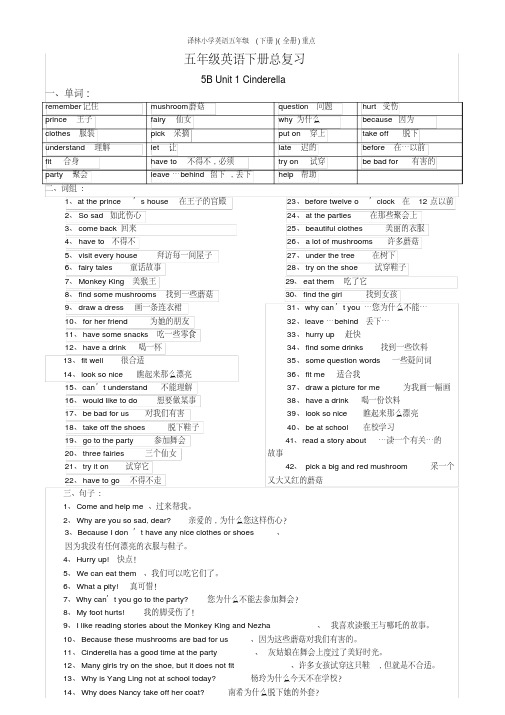
五年级英语下册总复习5B Unit 1 Cinderella一、单词:remember记住mushroom蘑菇question问题hurt受伤prince 王子fairy仙女why 为什么because 因为clothes服装pick 采摘put on 穿上take off 脱下understand 理解let 让late 迟的before 在…以前fit 合身have to 不得不,必须try on 试穿be bad for 有害的party 聚会leave…behind 留下,丢下help 帮助二、词组:1、at the prince’s house在王子的宫殿2、So sad 如此伤心3、come back回来4、have to不得不5、visit every house拜访每一间屋子6、fairy tales童话故事7、Monkey King 美猴王8、find some mushrooms找到一些蘑菇9、draw a dress画一条连衣裙10、for her friend 为她的朋友11、have some snacks吃一些零食12、have a drink喝一杯13、fit well 很合适14、look so nice瞧起来那么漂亮15、can’t understand不能理解16、would like to do想要做某事17、be bad for us 对我们有害18、take off the shoes 脱下鞋子19、go to the party 参加舞会20、three fairies 三个仙女21、try it on试穿它22、have to go不得不走23、before twelve o’clock 在12点以前24、at the parties在那些聚会上25、beautiful clothes 美丽的衣服26、a lot of mushrooms许多蘑菇27、under the tree 在树下28、try on the shoe试穿鞋子29、eat them 吃了它30、find the girl 找到女孩31、why can’t you…您为什么不能…32、leave…behind丢下…33、hurry up 赶快34、find some drinks 找到一些饮料35、some question words一些疑问词36、fit me 适合我37、draw a picture for me 为我画一幅画38、have a drink喝一份饮料39、look so nice 瞧起来那么漂亮40、be at school 在校学习41、read a story about…读一个有关…的故事42、 pick a big and red mushroom采一个又大又红的蘑菇三、句子:1、Come and help me、过来帮我。
剑桥(join in)版小学英语五年级下册单元知识梳理总结(全册)
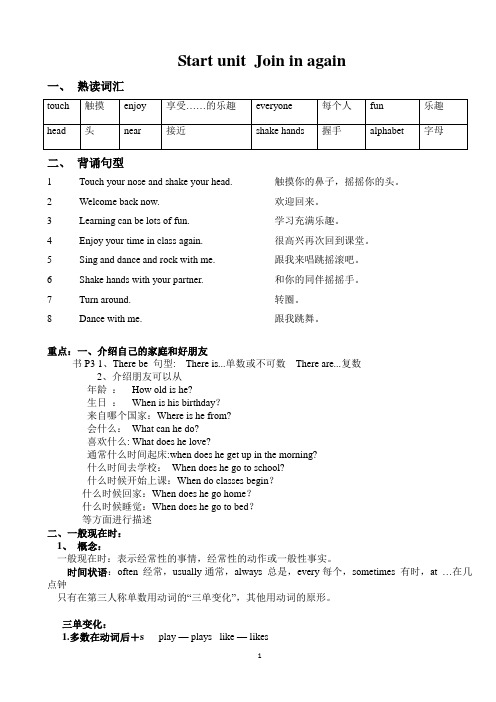
Start unit Join in again一、熟读词汇二、背诵句型1 Touch your nose and shake your head. 触摸你的鼻子,摇摇你的头。
2 Welcome back now. 欢迎回来。
3 Learning can be lots of fun. 学习充满乐趣。
4 Enjoy your time in class again. 很高兴再次回到课堂。
5 Sing and dance and rock with me. 跟我来唱跳摇滚吧。
6 Shake hands with your partner. 和你的同伴摇摇手。
7 Turn around. 转圈。
8 Dance with me. 跟我跳舞。
重点:一、介绍自己的家庭和好朋友书P3 1、There be 句型: There is...单数或不可数There are...复数2、介绍朋友可以从年龄:How old is he?生日:When is his birthday?来自哪个国家:Where is he from?会什么:What can he do?喜欢什么: What does he love?通常什么时间起床:when does he get up in the morning?什么时间去学校:When does he go to school?什么时候开始上课:When do classes begin?什么时候回家:When does he go home?什么时候睡觉:When does he go to bed?等方面进行描述二、一般现在时:1、概念:一般现在时:表示经常性的事情,经常性的动作或一般性事实。
时间状语:often 经常,usually通常,always 总是,every每个,sometimes 有时,at …在几点钟只有在第三人称单数用动词的“三单变化”,其他用动词的原形。
新精通版五年级下册小学英语全册单元知识点小结
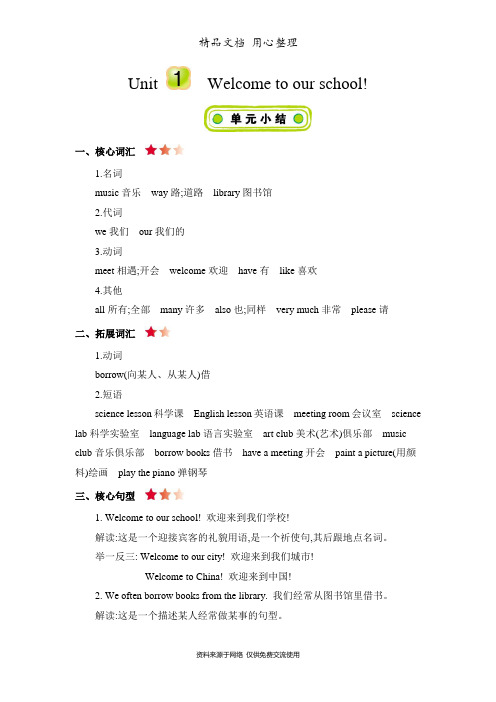
Unit Welcome to our school!一、核心词汇1.名词music音乐way路;道路library图书馆2.代词we我们our我们的3.动词meet相遇;开会welcome欢迎have有like喜欢4.其他all所有;全部many许多also也;同样very much非常please请二、拓展词汇1.动词borrow(向某人、从某人)借2.短语science lesson科学课English lesson英语课meeting room会议室science lab科学实验室language lab语言实验室art club美术(艺术)俱乐部music club音乐俱乐部borrow books借书have a meeting开会paint a picture(用颜料)绘画play the piano弹钢琴三、核心句型1. Welcome to our school! 欢迎来到我们学校!解读:这是一个迎接宾客的礼貌用语,是一个祈使句,其后跟地点名词。
举一反三: Welcome to our city! 欢迎来到我们城市!Welcome to China! 欢迎来到中国!2. We often borrow books from the library. 我们经常从图书馆里借书。
解读:这是一个描述某人经常做某事的句型。
举一反三: They often borrow some English books from Beijing Library. 他们经常从北京图书馆里借一些英语书。
3. —How many English lessons do you have in a week? 你们一周有多少节英语课?—We have three. 我们有三节。
解读:这是用来询问对方有多少节课的句型。
举一反三: —How many PE lessons do you have in a week? 你们一周有多少节体育课?—We have five. 我们有五节。
小学英语英语五年级下学期(冀教版)全册知识点归纳

Unit1 Going to Beijing一、词汇(千里之行,始于单词哦!)run 跑 sorry 对不起 sing 唱,唱歌dance 跳,跳舞 sit 坐down 向下,朝下,沿着stand 站立,直立 up 向上,在上面see 看见,明白,会见 look 看,瞧look out of 从……向外看 look at 看boy 男孩 girl 女孩 now 现在 draw 画picture 图片,照片woman 女人baby 婴儿 cry 哭,哭泣,喊叫talk 交谈,讨论man 男人sleep 睡觉,入睡who 谁 hungry 饥饿的 water 水tea 茶candy 糖果二、句型(学会了这些句子,会变得更加优秀哦!)1. Please don’t run/jump/sing/dance! 请不要跑/跳/唱歌/跳舞!2. Please sit down./Please stand up. 请坐下。
/请站起来。
3. Jenny is looking out of the window>詹妮正在火车上向窗外看。
4. Some boys and girls are playing there.一些男孩和女孩正在那里玩。
5. I see a banana! /I see dumplings!我看到一个香蕉。
/我看到饺子!6. A: Are you singing, Jenny? 你在唱歌吗,詹妮?B: No, I’m not. 不,我没有。
7. A:Who is talking? 谁在说话?B: Danny is talking. 詹妮正在说话。
8. The baby is sleeping now. 婴儿在睡觉。
9. A: Who is hungry? 谁饿了?B: I’m hungry! 我饿了!10. A: Would you like some fruit? 你想要一些水果吗?B: Yes, please. I’d like an apple and an orange, Mrs. Li.是的。
人教版PEP小学英语五年级下册知识点汇总(最新)
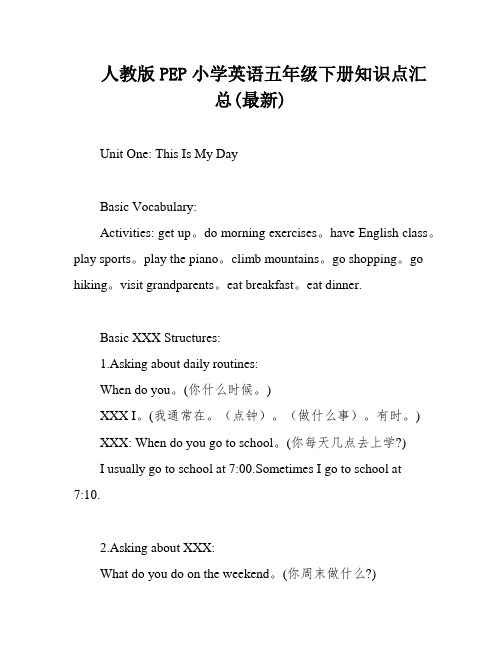
人教版PEP小学英语五年级下册知识点汇总(最新)Unit One: This Is My DayBasic Vocabulary:Activities: get up。
do morning exercises。
have English class。
play sports。
play the piano。
climb mountains。
go shopping。
go hiking。
visit grandparents。
eat breakfast。
eat dinner.Basic XXX Structures:1.Asking about daily routines:When do you。
(你什么时候。
)XXX I。
(我通常在。
(点钟)。
(做什么事)。
有时。
)XXX: When do you go to school。
(你每天几点去上学?)I usually go to school at 7:00.Sometimes I go to school at7:10.2.Asking about XXX:What do you do on the weekend。
(你周末做什么?)XXX I。
(我通常/经常。
有时。
)XXX: What do you do on the weekend?I often play XXX I go shopping with my mom.3.Introducing one's own habits:Every weekend。
I go hiking。
(我每个周末远足。
)Every day。
I do my homework at 8:00 in the evening。
(我每天晚上8点做作业。
)4.Asking XXX:What do you do。
(你是干什么的?)Time:morning。
afternoon。
evening。
noon。
at night。
6:00.on Sunday。
5年级下册英语的重点
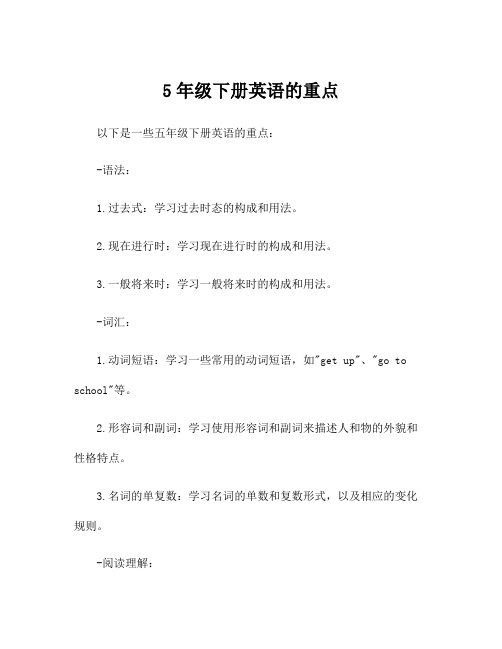
5年级下册英语的重点
以下是一些五年级下册英语的重点:
-语法:
1.过去式:学习过去时态的构成和用法。
2.现在进行时:学习现在进行时的构成和用法。
3.一般将来时:学习一般将来时的构成和用法。
-词汇:
1.动词短语:学习一些常用的动词短语,如"get up"、"go to school"等。
2.形容词和副词:学习使用形容词和副词来描述人和物的外貌和性格特点。
3.名词的单复数:学习名词的单数和复数形式,以及相应的变化规则。
-阅读理解:
1.短文理解:学习如何根据短文内容回答问题。
2.推理判断:学习通过对短文中信息的推理和判断,进行问题回答。
-口语表达:
1.日常交际用语:学习一些日常生活中常用的交际用语,如问候、请求、道谢等。
2.对话练习:通过对话练习,培养听说能力。
3.情景对话:学习在特定情境下进行对话交流。
-写作技巧:
1.句子结构:学习如何组织和连接句子,使文章流畅。
2.简单的写作练习:学习如何描述人、物、事件等,以及如何按
照时间顺序组织自己的写作。
这些只是五年级下册英语的一部分重点,具体的重点内容可能会
因不同教材和学校的教学要求而有所不同。
建议您根据教材和老师的
指导,仔细学习相关内容。
剑桥(join in)版小学英语五年级下册知识梳理总结(全册)

五年级下学期重点词句Unit 1 A phone call1. 电话用语: Is that Mike? 那边是迈克吗?Yes, it's Mike. 是的,我是迈克。
Who's speaking ? 谁打来的?It's your granny speaking. (This is your granny speaking.)是你的奶奶。
2. write emails 写邮件listen to music 听音乐watch TV programmes 看电视节目play games 玩游戏make phone calls 打电话visit websites 浏览网页see films 看电影send(get)messages 发送(接收)信息take photos 照相do shopping 购物take notes 做笔记watch the weather report 看天气预报3. What can you do with a mobile phone ? 你能用手机干什么?I can send and get messages. 我能发送和接收信息。
4. My cousin works hard at English. 我堂姐学习英语很认真。
Unit 2 Life in the Arctic1.jump in the water 跳进水里swim across the lake 游过湖walk through the snow 走过雪地run up the hill 跑上小山come to the top 来到山顶look around 环顾四周2.There are no playgrounds.There aren't any playgrounds. 这儿没有操场。
3.We are going to the playground.We'll go to the playground. 我们准备去操场。
五年级下册英语(冀教版)全册知识点归纳
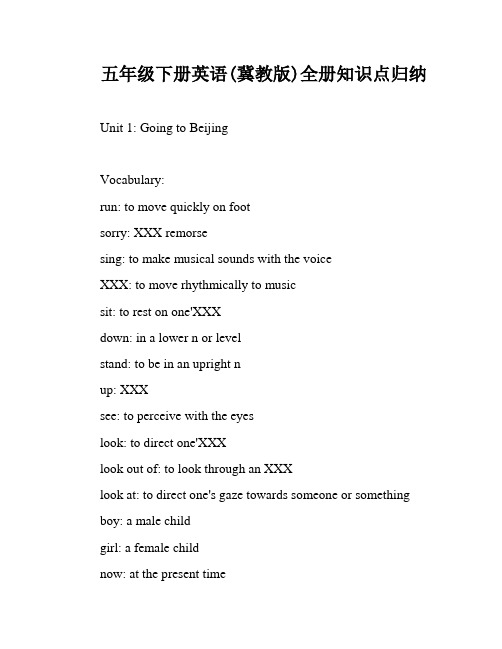
五年级下册英语(冀教版)全册知识点归纳Unit 1: Going to BeijingVocabulary:run: to move quickly on footsorry: XXX remorsesing: to make musical sounds with the voiceXXX: to move rhythmically to musicsit: to rest on one'XXXdown: in a lower n or levelstand: to be in an upright nup: XXXsee: to perceive with the eyeslook: to direct one'XXXlook out of: to look through an XXXlook at: to direct one's gaze towards someone or something boy: a male childgirl: a female childnow: at the present timedraw: to produce a picture or diagram by making lines and markspicture: a painting。
drawing。
or photographXXX: an XXXbaby: a very young childcry: XXX distress or painXXX: to speak in order to convey n or express ideasman: an adult malesleep: to rest with the eyes closed and the body inactivewho: used to ask for n about peoplehungry: XXX the need to eatwater: a colorless。
(完整版)人教版PEP五年级下册英语知识点复习总结
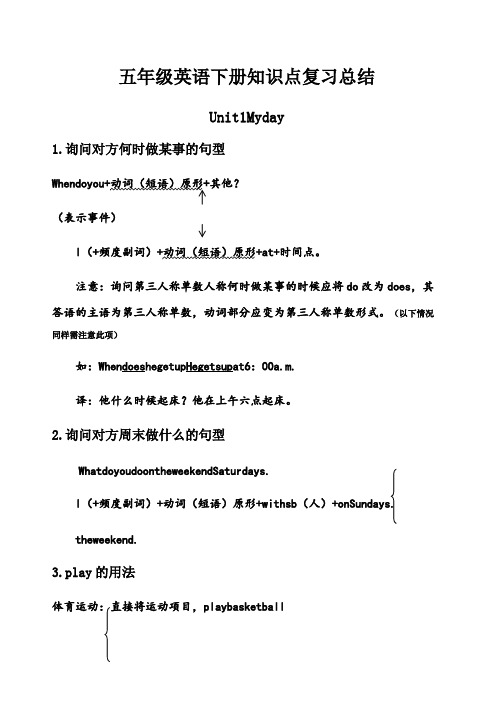
五年级英语下册知识点复习总结
Unit1Myday
1.询问对方何时做某事的句型
Whendoyou+动词(短语)原形+其他? (表示事件)
I(+频度副词)+动词(短语)原形+at+时间点。 注意:询问第三人称单数人称何时做某事的时候应将 do 改为 does,其 答语的主语为第三人称单数,动词部分应变为第三人称单数形式。(以下情况
同样需注意此项)
如:WhendoeshegetupHegetsupat6:00a.m. 译:他什么时候起床?他在上午六点起床。
2.询问对方周末做什么的句型
WhatdoyoudoontheweekendSaturdays. I(+频度副词)+动词(短语)原形+withsb(人)+onSundays. theweekend.
(2)在基数词后加 th:除去 first,second,third,其他基数词变序数词一般 直接在其后加 th。注意 five 与 twelve 要先把 ve 变 f,再加 th;eight 直接加 h;nine 去 e 再加 th。
(3)整十序数词以 ieth 结尾:整十位的序数词先将十位整数词尾的 y 变为 i, 再加 eth。如:twenty-twentieth。
The
注意:play-plays 因为 a 是元音 3)以 ch,sh,s,x 或 o 结尾的动词,在后面加-es; 例如 teach-teacheswash-washesdo-doesgo-goesfix-fixes
4)不规则的; 例如 have-has
5.by 的用法
五年级下册英语-全册知识点归纳 译林版

五年级下册英语-全册知识点归纳译林版Unit 1 Cinderella单词:prince(王子),fairy(仙女),why(为什么),because(因为),clothes(衣服),let(让),put on(穿上),before(在……以前),try on(试穿),have to(不得不;必须),fit(合适,合身),take off(脱下),mushroom(蘑菇),late(迟的,晚的),understand(明白,理解),pick(摘,拾),be bad for(有害的),leave。
behind(留下,丢下)重点词组:1.在王子的房子(at the prince's house)2.如此伤心(so sad)3.参加舞会(go to the party)4.拜访每一间屋子(visit every house)5.回来(XXX)6.过得愉快(have a good time)7.在聚会(at the party)8.脱下(take off)9.试穿(try on)10.必须走(have to go)11.留下,丢下(leave。
behind)12.在深林里(in the forest)13.在一棵树下(under a tree)14.摘一个大红色的蘑菇(pick a big red mushroom)15.看起来很漂亮(look so nice)16.对我们有害的(be bad for us)17.美猴王(Money King)18.读一个有关……的故事(read a story about。
)19.在学校研究(be at school)重点句型:1.过来帮我(Come and help me.)2.亲爱的,为什么你这样伤心?(Why are you so sad。
dear?)3.因为我没有任何漂亮的衣服和鞋子(Because I don't have any nice XXX)4.快点!(Hurry up!)5.我们可以吃它们了(We can eat them.)6.真可惜!(What a pity!)7.你为什么不能去参加舞会?(Why can't you go to the party?)8.我的脚受伤了!(My foot hurts!)9.我喜欢读猴王和XXX的故事(I like reading stories about the Monkey King and Nezha.)10.许多女孩试穿这双鞋,但是都不合适。
人教版五年级英语下册全册知识点总结
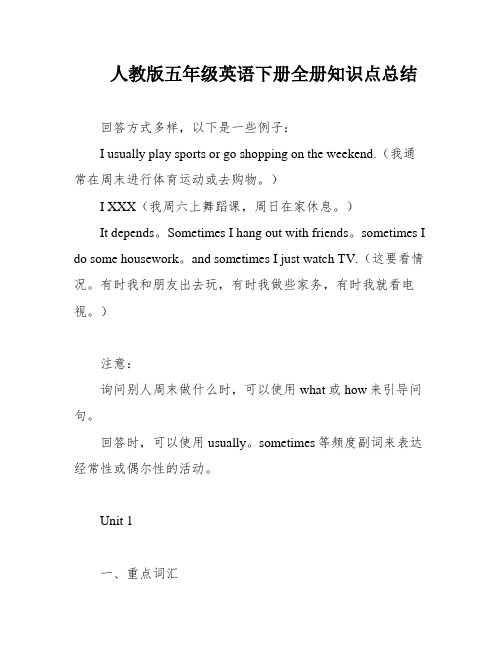
人教版五年级英语下册全册知识点总结回答方式多样,以下是一些例子:I usually play sports or go shopping on the weekend.(我通常在周末进行体育运动或去购物。
)I XXX(我周六上舞蹈课,周日在家休息。
)It depends。
Sometimes I hang out with friends。
sometimes I do some housework。
and sometimes I just watch TV.(这要看情况。
有时我和朋友出去玩,有时我做些家务,有时我就看电视。
)注意:询问别人周末做什么时,可以使用what或how来引导问句。
回答时,可以使用usually。
sometimes等频度副词来表达经常性或偶尔性的活动。
Unit 1一、重点词汇吃早餐:eat breakfast 上······课:have。
class进行体育运动:play sports做早操:do morning exercises 打扫我的房间:clean my room 去购物:go shopping舞蹈:dancing上午:a.m.通常地:usually二、其他日常活动起床:get up上床睡觉:go to bed活动,运动:exercise吃晚饭:eat XXX散步:go for a walk研究,上(课):XXX上舞蹈课:take a dancing class下午:p.m.吃午饭:eat XXX洗脸:XXX洗我的衣服:XXX看电视:watch TV打乒乓球:play ping-pong弹琵琶:play the pipa去游泳:go swimming去跑步:go running做作业:do homework练武术:do XXX踢足球:play football打篮球:play basketball三、语音cl→ [cl]:clean。
(完整版)人教版小学PEP英语五年级下册知识点归纳

人教版小学PEP英语五年级下册知识点归纳PEP五年级英语下册各单元知识点Unit 1 My day一、重点词汇。
1.四会词汇:eat breakfast 吃早饭 have···class 上······课play sports 进行体育运动exercise 活动;运动 domorning exercises做早操eat dinner吃晚饭clean my room 打扫我的房间go shopping 去买东西;购物go for a walk 散步take学习;上(课) dancing跳舞;舞蹈 take a dancing class 上舞蹈课2. 三会词汇:when什么时候after 在(时间)后start 开始usually 通常地;惯常地Spain 西班牙late 晚;迟 a.m. 午前;上午 p.m. 午后;下午why 为什么shop 去买东西;购物work 工作last 上一个的;刚过去的sound 听起来好像also 还;也busy 忙的 need 需要play 戏剧;剧本letter 信live 居住island 岛always 总是;一直cave 山洞;洞穴go swimming 去游泳 win 获胜二、其他日常活动。
get up起床 eat lunch吃午饭 go to bed 上床睡觉wash my face洗脸 wash my clothes 洗我的衣服 watch TV看电视play ping-pong打乒乓球 playthe pipa弹琵琶 go swimming去游泳go running去跑步 do homework 做作业 do kung fu练武术play football踢足球 play basketball打篮球三、频度副词。
always总是,一直(100%) usually通常(80%)often 经常(60%) sometimes(30%)有时四、疑问词。
五年级下册英语1到4单元知识点

五年级下册英语1到4单元知识点Unit 1: Holidays and festivals1. Vocabulary:- Holiday: A day when people do not go to work or school because of a special occasion.- Festival: A special time or event when people gather to celebrate something.- Celebrate: To do something special or enjoyable because of a special occasion.- Parade: A public celebration where people walk or drive along a route.- Costume: Special clothes that people wear for a party or festival.2. Grammar:- Present Simple Tense: Used to talk about habits, routines, facts, and general truths.- Adverbs of frequency: (Always, usually, often, sometimes, rarely, never) Used to show how often something happens.- Wh-questions: Questions that start with words like who, what, where, when, why, and how.3. Skills:- Reading: Understand different types of holidays and festivals around the world (e.g., Christmas, Thanksgiving, Chinese New Year).- Listening: Listen to conversations about holiday plans, traditions, and activities.- Speaking: Talk about favorite holidays and festivals and discuss how they are celebrated.- Writing: Write sentences and short paragraphs about holiday customs and traditions.Unit 2: Travelling1. Vocabulary:- Trip: A journey to a place and back again.- Journey: The act of traveling from one place to another.- Route: A way or course taken in getting from a starting point to a destination.- Vehicle: A machine that transports people or goods.- Sightseeing: To visit places of interest in a city or region.2. Grammar:- Present Continuous Tense: Used to talk about actions happening at the moment of speaking.- Imperatives: Commands or orders used to give instructions.- Prepositions of place: (In, on, at, by) Used to show the position or location of something.3. Skills:- Reading: Understand different types of transportation and travel destinations.- Listening: Listen to dialogues about booking tickets, planning trips, and giving directions.- Speaking: Describe travel experiences, ask for information, and give advice about traveling.- Writing: Write emails or postcards describing a recent trip, including details about accommodation, transportation, and sightseeing.Unit 3: Weather and seasons1. Vocabulary:- Weather: The condition of the atmosphere at a particular place and time.- Season: One of the four periods of the year (spring, summer, autumn, winter).- Temperature: How hot or cold the air is.- Forecast: A prediction of the weather in the future.- Sunny, cloudy, rainy, snowy: Different types of weather conditions.2. Grammar:- Present Continuous Tense: Used to talk about temporary actions happening now.- Comparative adjectives: (Bigger, smaller, hotter, colder) Used to compare two things.- Superlative adjectives: (The biggest, the smallest, the hottest, the coldest) Used to compare three or more things.3. Skills:- Reading: Understand the characteristics of each season and how they affect the weather.- Listening: Listen to weather forecasts, descriptions of seasons, and discussions about dressing for the weather.- Speaking: Talk about favorite seasons, describe typical weather in different seasons, and discuss clothing choices for different weather conditions.- Writing: Write short essays about favorite seasons, create weather forecasts, and describe seasonal activities and events.Unit 4: Animals and habitats1. Vocabulary:- Habitat: The natural home or environment of an animal, plant, or other organism.- Endangered: Threatened with extinction or destruction.- Species: A group of living organisms capable of interbreeding.- Predators: Animals that hunt and kill other animals for food.- Herbivores, carnivores, omnivores: Different types of animals based on their diet.2. Grammar:- Present Simple Tense: Used to talk about habits, routines, facts, and general truths.- Countable and uncountable nouns: Countable nouns can be counted (e.g., animals, trees), while uncountable nouns cannot be counted (e.g., water, air).- How much/many: Used to ask about the quantity of something (how much for uncountable nouns, how many for countable nouns).3. Skills:- Reading: Understand different types of animals and their habitats, including endangered species.- Listening: Listen to descriptions of animals, their behaviors, and their relationships with other animals.- Speaking: Talk about favorite animals, habitats, animal conservation, and animal-related activities.- Writing: Write reports about endangered animals, create posters about animal habitats, and describe animal behaviors and characteristics.。
小学五年级英语下册知识点总结

M10U1-------重点词组:1. this weekend 这个周末2. I don’t know 我不知道3. I think so 我也这样认为4. all right 没事,没问题5. make a list of things to do 列一个要做事情的清单6. safe trip 旅行安全,一路顺风7. feel nervous 感觉到紧张重点句型:1.Where are you going this weekend, Sam?萨姆你这个周末要去哪里?2.When are you going to get up ?你将要什么时候起床?3.Mum ,what did you say to me ?妈妈,你刚刚对我说了什么?4.Are you ready for your trip tomorrow ?你准备好你明天的旅行了吗?5.I’m going to meet you in New York .我将要在纽约接你。
6.You can make a list of things to do .你可以列一个要做事情的清单7.What are you going to take ? 你将要带什么东西?8.When are you going to the airport?你什么时候去机场?9.Who’s going to the airport with you ?谁将要跟你一起去?U2-------重点词组:1. arrive there 到那2. at the airport 在机场3. take a yellow taxi 乘坐一辆黄色出租车4. lots of tall building 许多高大的建筑物5. find out 找到、发现6. a big exciting word 一个令人激动的大世界7. by plane 乘飞机8. have a party 举办一个聚会9. sing a song 唱一首歌10. play a game 玩个游戏11. make a plan 制作一个计划12. at the zoo 在动物园里13. take lots of photos 照了许多照片重点句型:1.I’m in New York now. 我现在在纽约。
- 1、下载文档前请自行甄别文档内容的完整性,平台不提供额外的编辑、内容补充、找答案等附加服务。
- 2、"仅部分预览"的文档,不可在线预览部分如存在完整性等问题,可反馈申请退款(可完整预览的文档不适用该条件!)。
- 3、如文档侵犯您的权益,请联系客服反馈,我们会尽快为您处理(人工客服工作时间:9:00-18:30)。
PEP小学五年级下册英语知识点总结全册第一单元知识点一、主要单词:do morning exercises 晨练,做早操eat breakfast吃早饭have English class上英语课play sports进行体育活动eat dinner吃晚饭eat lunch吃午饭climb mountains 爬山go shopping购物,买东西play the piano 弹钢琴visit grandparents 看望(外)祖父母go hiking去远足二、主要句子: When do you eat dinner?你什么时候吃晚饭?I eat dinner at 7:00 in the evening. 我晚上七点吃晚饭。
When do you get up? 你什么时候起床?I usually get up at 12:00 at noon.我通常在中午12点起床。
What do you do on the weekend?你在周末干什么?Usually I watch TV and go shopping. 我通常看电视和购物。
Sometimes I visit my grandparents.有时候我去看望我的外祖父母。
I often play football. 我经常踢足球。
Sometimes I go hiking.有时候我去远足。
三、同义词eat breakfast—have breakfast eat lunch—have lunch eat dinner—have dinner play sports—do sportsusually—often复数形式:policeman—policemen policewoman—policewomen现在分词:tell—telling三单:say—says同义句:What do you do ? ---What are you? 你是干什么的?四、表示频度的副词:always 总是,一直usually通常,常常often 经常sometimes 有时候五、以复数形式出现的词组:visit grandparents plant trees六、介词后跟表示时间的词语时,表示在某年、某月、某个季节,某个时候(在上午,在下午,在晚上)用in;表示在某一天,在星期几用on,在具体的几点几分用at.七、too 和either的用法区别:too和either都是“也”的意思,但too用于肯定句,either用于否定句。
第二单元知识点一、主要单词:season季节spring春天summer夏天fall冬天winter冬天swim游泳fly kites放风筝skate滑冰make a snowman堆雪人plant trees 种树主要句子:Which season do you like best?你最喜欢哪个季节?I like winter best.我最喜欢冬天。
Summer is good, but fall is my favourite season。
夏天是很好,但是冬天是我最喜爱的季节。
Why do you like summer?你为什么喜欢夏天?Because I can swim in the lake.因为我可以在湖里游泳。
Why do you like winter?你为什么喜欢冬天?Because I can sleep a long time.因为我可以睡很长时间的觉。
三、同义词:autumn—fall三单:say—says ask—asks come—comes对应词:wake up—sleep go to bed—get up同义句:What’s your favourite season?(你最喜爱的季节是什么?)----Which season do you like best?(你最哪个季节?)四、play with 玩雪,play in the snow在雪中玩. 如果在横线后面有the ,则选择in ,如果在横线后面没有the , 则选择with.五、like后面不能直接跟动词。
如果需要跟动词或动词性词组时,则需在like后面加to. 如果不加to. 就要把后面的动词变成相应的动名词形式. 如:I like to swim ===I like swimming.六、当表示某地某个季节的天气情况时,要把季节放在前面,地点放在后面。
其结构为:What’s the weather like in 季节in 地点?第三单元知识点一、主要单词:January (Jan.) February (Feb.) March (Mar.) April(Apr.) May June July August(Aug.) September(Sept.) October( Oct.) November (Nov.) December ( Dec.)二、主要句子1. When is your birthday?你的生日是什么时候It’s in May. 在五月。
2. My birthday is in June. Uncle Bill’s birthday is in June, too.我的生日在六月。
比尔叔叔的生日也在六月。
3. Is her birthday in June? 她的生日在六月吗?Yes.是的。
4.What’s the date?是几月几日?June 9th .六月九日。
5. What’s the date today?今天是几月几日?It’s April 10th. 四月十日。
三、主要知识点:1、关于月份:(1)五月May , 六月June, 七月July,没有简写形式。
九月September 的简写形式是前四个字母加点Sept.其他八个月的简写形式是前三个字母加点。
(2)无论是完全形式还是简写形式,表示12个月的单词的第一个字母都要大写。
2、关于基数词变序数词。
(1)一般情况下,直接在基数词后面加th. (one , two , three 除外)。
one—first , two—second , three—third .(2) 以ve结尾的基数词,变ve为f, 再加th. 如:five—fifth , twelve —twelfth. (3)以t结尾的基数词,直接加h。
如eight—eighth. (4) 以不发音的字母e结尾的,丢掉不发音的字母e,再加th.如nine—ninth.(5)以y结尾的整十数,在变为序数词时,将y变为ie,再加th.如twenty—twentieth .(6)20以上的两位数,变为序数词时,十位数不变,只将个位上的数变为序数词。
如:twenty-one----twenty-first , twenty-two—twenty-second , thirty-four—thirty-fourth .(7)序数词的简写形式为表示该词的阿拉伯数字加上该单词的最后两个字母,最后两个字母要变成上标格式。
如:first—1st , second —2nd , third—3rd , fourth—4th . twentieth—20th3. 在回答When is your birthday?这个问题时,如果只说明生日在几月份,在月份前用in.如My birthday is in July. 如果要具体说明生日是在几月几日,则要把in去掉,直接用is,或者在is后加on。
如My birthday is June 9th. 或My birthday is on June 9th .4.注意区分两个句子:What day is it today ?今天星期几?What’s the date today? 今天是几月几日?5. 根据要求写单词:make (现在分词)---making. send( 现在分词)---sending.6.句子:How many birthdays are in October ?有几个人的生日在十月?There are 3.7. My birthday is in February .(变为一般疑问句)---Is your birthday in February?8. Does she have a computer?她有计算机吗?当第三人称单数和句子中出现了does时,其他动词必须使用原型。
9、读序数词时,前面一定要加the. 如October 1st .读作October the first.10、同义句:Who has a birthday in October?===Whose birthday is in October?第四单元知识点一、主要单词:draw pictures 画画drawing pictures 正在画画do the dishes 洗碗碟doing the dishes正在洗碗碟cook dinner 做饭cooking dinner正在做饭read a book读书reading a book正在读书answer the phone 接电话answering the phone正在接电话listen to music听音乐listening ti music正在听音乐wash clothes洗衣服washing clothes正在洗衣服clean the room打扫房间cleaning the room正在打扫房间write a letter 写信writing a letter 正在写信write an e-mail写电子邮件writing an e-mail正在写电子邮件二、主要句子:1. This is Zhang Peng .(电话用语)我是张朋。
What are you doing?你正在干什么?2.I’m doing the dishes.我正在洗碗碟。
I’m reading a book。
我正在读书。
3.Grandpa is writing a letter。
爷爷正在写信。
Brother is doing homework. 弟弟正在做作业。
4.Mom is cooking dinner in the kitchen.妈妈正在厨房里做饭。
5.Dad is writing an e-mail in the study.爸爸正在书房里写电子邮件。
三、知识点:1、在电话中介绍自己时,可以用“It’s …”或者‘This is ….’。
但是不能用“I am …”或者“My name is …”2.在电话中表另一个人接电话时,应该说:“Can I speak to …?”3、告诉别人接电话时,说:There is a call for you.4、在接电话时请别人稍候说:Hold on please.或者Please hold on.5、动词变为现在分词(加ing)的规则:(1)一般情况下,在动词的后面直接加ing.如:play—playing clean—cleaning draw—drawing cook—cooking(2) 以单个不发音的字母e结尾的动词,去掉不发音的字母e,再加ing .如:write—writing come—coming take—taking make—making leave—leaving have—having(3) 以重读闭音世结尾的动词,如果词尾只有一个辅音字母,则要先双写这个辅音字母,再加ing.如:run—running swim—swimming put—putting sit—sitting set—setting第五单元知识点一、主要单词fly 飞flying正在飞walk 走walking正在走jump跳jumping正在跳run跑running正在跑swim游泳swimming正在游climb爬climbing正在爬fight 打架fighting正在打架swing荡秋千swinging 正在荡秋千drink water喝水drinking water正在喝水二、主要句子:1. What is it doing?它正在干什么?It’s eating bananas.它正在吃香蕉。
